-
 Bitcoin
Bitcoin $105,713.8056
3.44% -
 Ethereum
Ethereum $2,448.3377
7.44% -
 Tether USDt
Tether USDt $1.0005
-0.01% -
 XRP
XRP $2.1892
8.88% -
 BNB
BNB $642.1253
2.79% -
 Solana
Solana $144.4049
6.28% -
 USDC
USDC $1.0000
-0.02% -
 TRON
TRON $0.2738
1.20% -
 Dogecoin
Dogecoin $0.1642
6.61% -
 Cardano
Cardano $0.5861
7.46% -
 Hyperliquid
Hyperliquid $38.0472
6.61% -
 Sui
Sui $2.7809
11.17% -
 Chainlink
Chainlink $13.5044
14.64% -
 Bitcoin Cash
Bitcoin Cash $450.9966
0.93% -
 UNUS SED LEO
UNUS SED LEO $9.1282
0.68% -
 Stellar
Stellar $0.2478
7.70% -
 Avalanche
Avalanche $18.1694
8.09% -
 Toncoin
Toncoin $2.9073
3.99% -
 Shiba Inu
Shiba Inu $0.0...01166
6.14% -
 Hedera
Hedera $0.1525
10.64% -
 Litecoin
Litecoin $84.4484
3.86% -
 Monero
Monero $319.2184
7.30% -
 Ethena USDe
Ethena USDe $1.0006
0.02% -
 Polkadot
Polkadot $3.4709
8.34% -
 Dai
Dai $0.9999
-0.02% -
 Bitget Token
Bitget Token $4.2814
6.14% -
 Uniswap
Uniswap $7.0518
12.26% -
 Pepe
Pepe $0.0...01001
10.11% -
 Pi
Pi $0.5427
7.23% -
 Aave
Aave $265.8182
14.99%
how to buy and sell bitcoin in india
Buying and selling Bitcoin in India requires navigating evolving regulations; choose reputable exchanges, understand the risks (including price volatility), and prioritize account security.
Mar 23, 2025 at 09:35 pm

How to Buy and Sell Bitcoin in India
Buying and selling Bitcoin in India involves navigating a regulatory landscape that's still evolving. While not explicitly banned, there's a lack of clear, comprehensive legislation specifically addressing cryptocurrencies. This means understanding the risks and choosing reputable platforms is crucial. The process itself isn't overly complicated, but requires careful consideration and due diligence.
Choosing an Exchange:
The first step is selecting a cryptocurrency exchange operating in India. Several exchanges cater to the Indian market, each with its own fees, security measures, and features. Consider factors like trading volume, security reputation, user interface, and available customer support before making your choice. Research reviews and compare offerings to find the best fit for your needs and risk tolerance.
Account Creation and Verification:
Once you've chosen an exchange, you'll need to create an account. This usually involves providing personal information like your name, address, and proof of identification. KYC (Know Your Customer) and AML (Anti-Money Laundering) regulations require exchanges to verify user identities to comply with Indian financial regulations. This verification process might take some time, so be patient.
Funding Your Account:
After your account is verified, you need to deposit funds. Most Indian exchanges support INR (Indian Rupee) deposits via various methods, including bank transfers, UPI (Unified Payments Interface), and net banking. The specific options available will depend on the exchange you choose. Carefully review the deposit limits and any associated fees.
Buying Bitcoin:
Once your account is funded, you can finally buy Bitcoin. Simply navigate to the Bitcoin trading section of your chosen exchange. You'll see the current market price and can place an order to buy a specific amount of Bitcoin. You can choose between market orders (buying at the current market price) or limit orders (buying at a specified price).
Selling Bitcoin:
Selling Bitcoin is the reverse process. Navigate to the Bitcoin trading section, and place a sell order. Similar to buying, you can choose between market and limit orders. Once your order is executed, the equivalent INR value will be credited to your exchange account.
Withdrawing Funds:
After selling your Bitcoin, you can withdraw your INR from the exchange back to your bank account. The withdrawal process might involve verifying your bank details and potentially incurring fees. Always double-check the withdrawal instructions provided by your exchange to ensure a smooth transaction.
Understanding Risks:
The cryptocurrency market is inherently volatile. Bitcoin's price can fluctuate significantly in short periods. Investing in Bitcoin carries substantial risk of loss. Only invest what you can afford to lose, and never invest based on hype or speculation. Diversification is crucial in any investment portfolio.
Security Best Practices:
Secure your exchange account with a strong, unique password and enable two-factor authentication (2FA) whenever possible. Be cautious of phishing scams and avoid sharing your login credentials with anyone. Regularly review your account activity for any unauthorized transactions.
Tax Implications:
In India, the tax treatment of cryptocurrency transactions is still evolving. It’s advisable to consult with a tax professional to understand your tax obligations regarding Bitcoin gains and losses. Keeping accurate records of all your transactions is crucial for tax compliance.
Alternative Methods:
While exchanges are the most common way to buy and sell Bitcoin in India, peer-to-peer (P2P) platforms are also an option. These platforms connect buyers and sellers directly, often bypassing the need for an intermediary exchange. However, P2P transactions carry higher risks, particularly concerning security and fraud.
Using a Hardware Wallet:
Once you've accumulated a significant amount of Bitcoin, consider transferring it to a hardware wallet for enhanced security. Hardware wallets provide a higher level of protection against hacking and theft compared to keeping your Bitcoin on an exchange.
Staying Informed:
The cryptocurrency market is constantly changing. Stay informed about the latest news, regulations, and technological developments to make informed investment decisions. Regularly research and update your knowledge on cryptocurrency trading and investment strategies.
Frequently Asked Questions:
Q: Is Bitcoin legal in India?
A: Bitcoin is not explicitly banned in India, but its regulatory status remains unclear. The government is currently developing a comprehensive regulatory framework.
Q: What are the fees involved in buying and selling Bitcoin in India?
A: Fees vary depending on the exchange, including deposit fees, trading fees, and withdrawal fees. Check the specific fee schedule of your chosen exchange.
Q: How long does it take to verify my account on an Indian cryptocurrency exchange?
A: Verification times vary, but it can typically take anywhere from a few hours to a few days.
Q: Are there any tax implications for buying and selling Bitcoin in India?
A: Yes, there are tax implications. Consult a tax professional for advice on your specific situation. Currently, income from cryptocurrency transactions is taxed as income from other sources.
Q: What are the risks involved in buying and selling Bitcoin in India?
A: The primary risk is the volatility of the Bitcoin price. There are also risks associated with exchange security and potential regulatory changes.
Q: What is a hardware wallet, and why should I use one?
A: A hardware wallet is a physical device designed to store cryptocurrency offline, offering enhanced security compared to software wallets. It’s recommended for larger holdings.
Q: What are peer-to-peer (P2P) platforms, and are they safe?
A: P2P platforms connect buyers and sellers directly. While they can offer competitive prices, they carry higher risks related to security and fraud compared to regulated exchanges.
Disclaimer:info@kdj.com
The information provided is not trading advice. kdj.com does not assume any responsibility for any investments made based on the information provided in this article. Cryptocurrencies are highly volatile and it is highly recommended that you invest with caution after thorough research!
If you believe that the content used on this website infringes your copyright, please contact us immediately (info@kdj.com) and we will delete it promptly.
- BlockDAG's Bold Move: A $100 Million Token Airdrop Fuels Ecosystem Growth
- 2025-06-25 00:45:12
- BlockDAG, Cardano, and Tron: Navigating the Altcoin Landscape in 2025
- 2025-06-25 01:05:13
- Aero Crypto (AERO): 100x Altcoin or Just Jumped 14%? Decoding the Hype
- 2025-06-25 00:25:12
- Banish Flies with a Coin Trick? The Buzz Around This Bizarre Hack
- 2025-06-25 00:45:12
- Metaplanet's Bold Bitcoin Allocation: A New York Minute on Tokyo's Crypto Play
- 2025-06-25 01:25:13
- Solana, Upexi, and Insider Sales: A New Era for Crypto Treasuries?
- 2025-06-25 01:05:13
Related knowledge
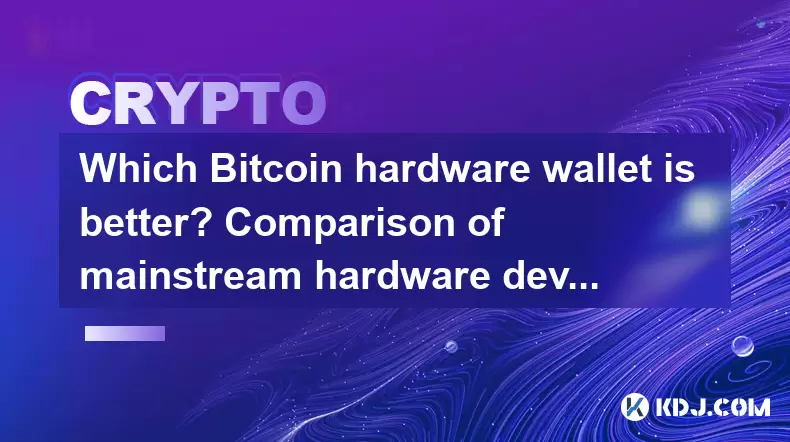
Which Bitcoin hardware wallet is better? Comparison of mainstream hardware devices
Jun 16,2025 at 02:08am
What Is a Bitcoin Hardware Wallet?A Bitcoin hardware wallet is a physical device designed to securely store the private keys associated with your cryptocurrency holdings. Unlike software wallets, which are more vulnerable to online threats, hardware wallets keep private keys offline, significantly reducing the risk of unauthorized access. These devices ...
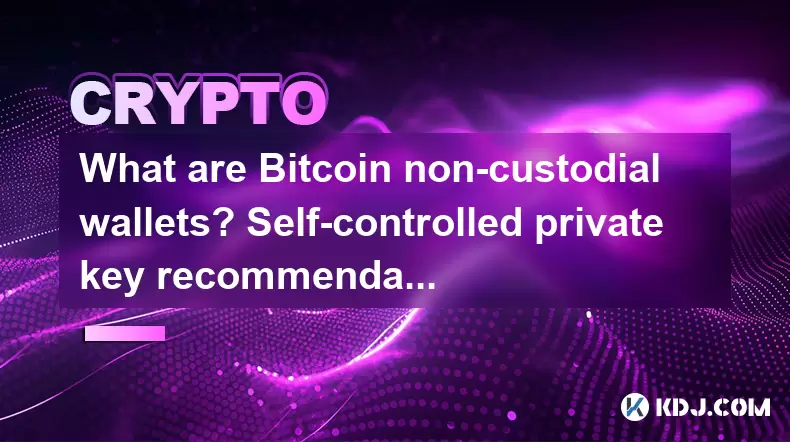
What are Bitcoin non-custodial wallets? Self-controlled private key recommendation
Jun 16,2025 at 11:29pm
Understanding Bitcoin Non-Custodial WalletsA Bitcoin non-custodial wallet is a type of digital wallet where users retain full control over their private keys. Unlike custodial wallets, which are managed by third-party services such as exchanges, non-custodial wallets ensure that only the user can access and manage their funds. This means no intermediary...
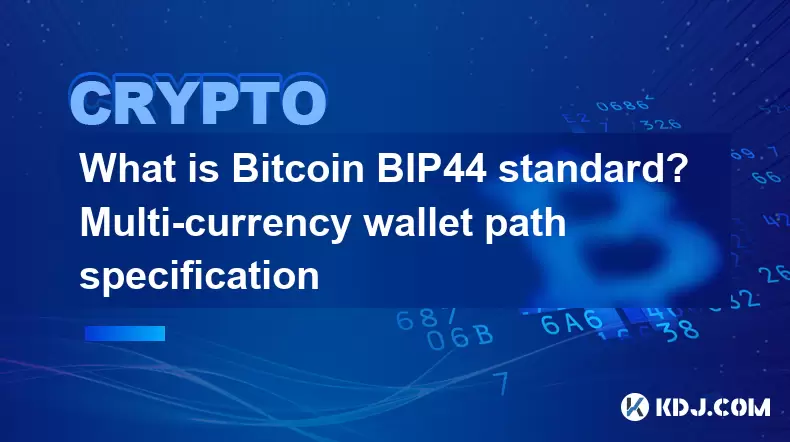
What is Bitcoin BIP44 standard? Multi-currency wallet path specification
Jun 15,2025 at 04:08pm
Understanding the BIP44 Standard in Bitcoin and CryptocurrencyThe BIP44 standard, which stands for Bitcoin Improvement Proposal 44, is a widely adopted hierarchical deterministic wallet structure used across various cryptocurrencies. It defines a structured path format that enables wallets to support multiple currencies while maintaining consistency and...
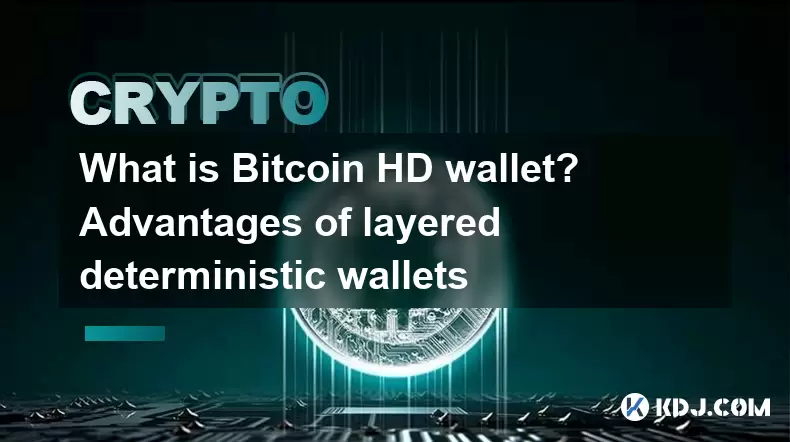
What is Bitcoin HD wallet? Advantages of layered deterministic wallets
Jun 16,2025 at 03:56pm
Understanding Bitcoin HD WalletsA Bitcoin HD wallet, or Hierarchical Deterministic wallet, is a type of cryptocurrency wallet that generates multiple keys and addresses from a single seed phrase. Unlike traditional wallets that create random private keys for each transaction, an HD wallet follows a structured hierarchy to derive keys in a deterministic ...
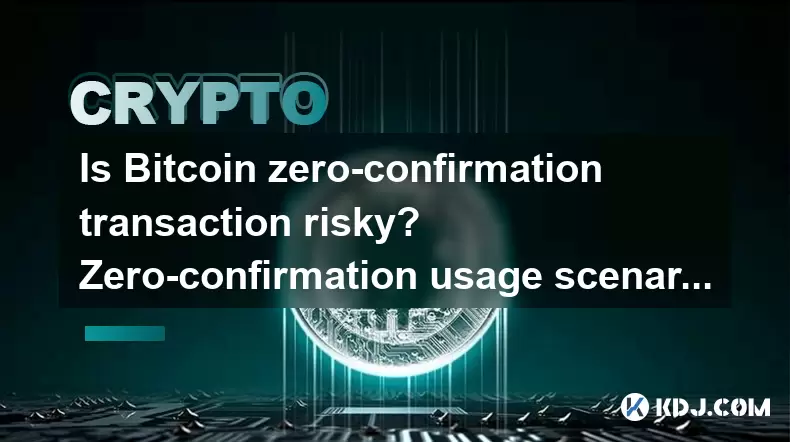
Is Bitcoin zero-confirmation transaction risky? Zero-confirmation usage scenarios
Jun 15,2025 at 03:57am
Understanding Zero-Confirmation Transactions in BitcoinBitcoin zero-confirmation transactions, often referred to as 'unconfirmed transactions,' are those that have been broadcast to the network but have not yet been included in a block. This means they have not received any confirmations from miners. While these transactions can be useful in certain con...
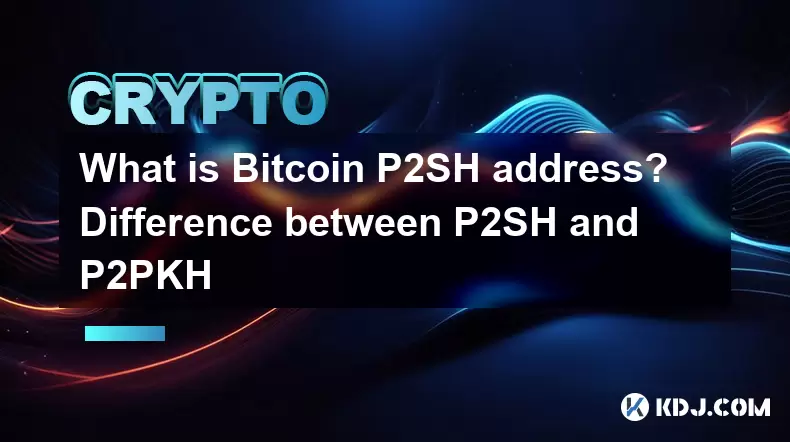
What is Bitcoin P2SH address? Difference between P2SH and P2PKH
Jun 16,2025 at 09:49pm
Understanding Bitcoin P2SH AddressesA Pay-to-Script-Hash (P2SH) address in the Bitcoin network is a type of address that allows users to send funds to a script hash rather than directly to a public key hash, as seen in earlier address formats. This innovation was introduced through BIP 16, enhancing flexibility and enabling more complex transaction type...

Which Bitcoin hardware wallet is better? Comparison of mainstream hardware devices
Jun 16,2025 at 02:08am
What Is a Bitcoin Hardware Wallet?A Bitcoin hardware wallet is a physical device designed to securely store the private keys associated with your cryptocurrency holdings. Unlike software wallets, which are more vulnerable to online threats, hardware wallets keep private keys offline, significantly reducing the risk of unauthorized access. These devices ...

What are Bitcoin non-custodial wallets? Self-controlled private key recommendation
Jun 16,2025 at 11:29pm
Understanding Bitcoin Non-Custodial WalletsA Bitcoin non-custodial wallet is a type of digital wallet where users retain full control over their private keys. Unlike custodial wallets, which are managed by third-party services such as exchanges, non-custodial wallets ensure that only the user can access and manage their funds. This means no intermediary...

What is Bitcoin BIP44 standard? Multi-currency wallet path specification
Jun 15,2025 at 04:08pm
Understanding the BIP44 Standard in Bitcoin and CryptocurrencyThe BIP44 standard, which stands for Bitcoin Improvement Proposal 44, is a widely adopted hierarchical deterministic wallet structure used across various cryptocurrencies. It defines a structured path format that enables wallets to support multiple currencies while maintaining consistency and...

What is Bitcoin HD wallet? Advantages of layered deterministic wallets
Jun 16,2025 at 03:56pm
Understanding Bitcoin HD WalletsA Bitcoin HD wallet, or Hierarchical Deterministic wallet, is a type of cryptocurrency wallet that generates multiple keys and addresses from a single seed phrase. Unlike traditional wallets that create random private keys for each transaction, an HD wallet follows a structured hierarchy to derive keys in a deterministic ...

Is Bitcoin zero-confirmation transaction risky? Zero-confirmation usage scenarios
Jun 15,2025 at 03:57am
Understanding Zero-Confirmation Transactions in BitcoinBitcoin zero-confirmation transactions, often referred to as 'unconfirmed transactions,' are those that have been broadcast to the network but have not yet been included in a block. This means they have not received any confirmations from miners. While these transactions can be useful in certain con...

What is Bitcoin P2SH address? Difference between P2SH and P2PKH
Jun 16,2025 at 09:49pm
Understanding Bitcoin P2SH AddressesA Pay-to-Script-Hash (P2SH) address in the Bitcoin network is a type of address that allows users to send funds to a script hash rather than directly to a public key hash, as seen in earlier address formats. This innovation was introduced through BIP 16, enhancing flexibility and enabling more complex transaction type...
See all articles
























































































